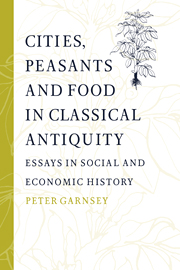Book contents
- Frontmatter
- Contents
- Preface
- Editor's preface
- Acknowledgements
- List of abbreviations
- PART I CITIES
- 1 Aspects of the decline of the urban aristocracy in the empire
- 2 Independent freedmen and the economy of Roman Italy under the Principate
- 3 Economy and society of Mediolanum under the Principate
- 4 Urban property investment in Roman society
- 5 An association of builders in late antique Sardis
- PART II PEASANTS
- PART III FOOD
- Bibliography
- Index
1 - Aspects of the decline of the urban aristocracy in the empire
Published online by Cambridge University Press: 02 December 2009
- Frontmatter
- Contents
- Preface
- Editor's preface
- Acknowledgements
- List of abbreviations
- PART I CITIES
- 1 Aspects of the decline of the urban aristocracy in the empire
- 2 Independent freedmen and the economy of Roman Italy under the Principate
- 3 Economy and society of Mediolanum under the Principate
- 4 Urban property investment in Roman society
- 5 An association of builders in late antique Sardis
- PART II PEASANTS
- PART III FOOD
- Bibliography
- Index
Summary
INTRODUCTION
The theme of decline and fall remains irresistible to historians of the Roman Empire. No one who has tangled with the issue can be unaware that the decline of the aristocracy of the cities was closely bound up with the decline of the Empire at large.
The main outlines are well known and uncontroversial. The members of the local councils of cities, that is, the decurions or curiales, bore the brunt of the financial burdens of the imperial administration. At one time, local office carried sufficient prestige and privilege to compensate for the expenditures it entailed. By the fourth if not late-third century, however, because of the mounting costs of government, external interference in city administration, and a decline in local prosperity, it had lost its appeal. In the early Empire service in the local council of a city was both voluntary and sought-after; by the fourth century, it was compulsory, to be evaded if at all possible. Faced with the flight of decurions from their cities, the central administration sought to block the escape-routes, both by restricting the entry of decurions into other professions or occupations, including the clergy, the army and the imperial administration itself, and by forcing sons to follow fathers into local government. This policy pointed to the eventual transformation of the local government. This policy pointed to the eventual transformation of the local aristocracy into a hereditary order.
- Type
- Chapter
- Information
- Cities, Peasants and Food in Classical AntiquityEssays in Social and Economic History, pp. 3 - 27Publisher: Cambridge University PressPrint publication year: 1998



